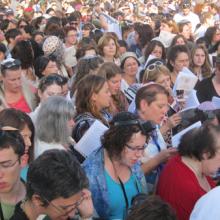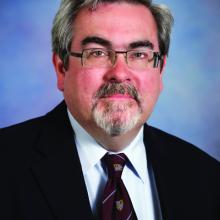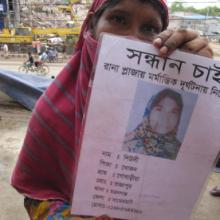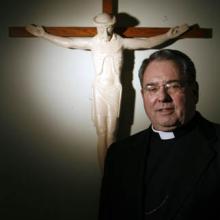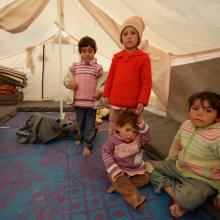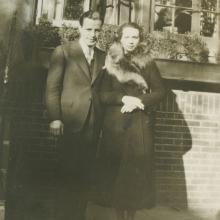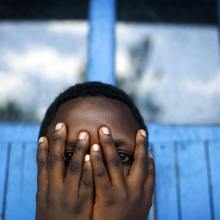Human Rights
ETHICS ASKS the questions: What is right to do? How do we know? David P. Gushee puts the concept of the sacredness of human life at the center of his moral reasoning. A professor of Christian ethics at Mercer University in Atlanta, Gushee has given us a work that is an important milestone on the road of constructive Christian ethics.
In this book Gushee has set himself a large and ambitious goal. He writes, “I am proposing that, rightly understood, a moral norm called the sacredness of life should be central to the moral vision and practice of followers of Christ.”
He seeks to ground this moral norm in scriptural authority and in the Christian tradition at its best. His survey of scripture and of Christian history is truly impressive, considering most of the major elements of the Christian theological and ethical traditions, including the current thinking of liberation theology. He demonstrates knowledge of the feminist critique of scripture, and he at least mentions eco-feminism. The bibliography alone is worth the price of the book.
Moreover, Gushee also considers such important Enlightenment thinkers as John Locke and Immanuel Kant. He devotes a chapter each to German philosopher Friedrich Nietzsche and to the Nazi desecration of human life. There is much food for thought here.
For me, however, the book is primarily descriptive. And it does not provide an explanatory framework to help us understand why scripture and the Christian tradition have led the way in both the recognition of the sacredness of human life and in the violation of this holiness. It would have been helpful for Gushee to give us a brief discussion of Ernst Troeltsch, who in his two-volume The Social Teachings of the Christian Churches enables us to see that the line of demarcation between the church and the world is porous to the point that there is always interpenetration between the two. Church teachings leaven and flavor the moral thinking of the world outside its doors while the world’s often destructive ideologies come to church every Sunday and sit down on the front pew and sometimes preach from the pulpit.
The Jewish Federations of North America announced Monday that its trustees had passed a resolution in favor of a nonsegregated place where men and women can pray and read from the Torah at the Western Wall, the Jewish holy site.
Worshippers at the Western Wall now have two options: separate men’s and women’s sections, both under the auspices of the Ministry of Religious Affairs, an Orthodox institution.
The egalitarian plan will allow the Western Wall to “become a spiritual center for all Jews and a symbol of unity for the entire Jewish community world-wide,” the federation statement said.
The Evangelical Lutheran Church in America has elected its first openly gay bishop, the Rev. R. Guy Erwin, to oversee churches in Southern California, four years after the church allowed openly gay men and lesbians to serve as clergy.
Following a wider trend within other mainline Protestant denominations to appoint gays and lesbians to leadership positions, the ELCA’s five-county Southwest California Synod elected Erwin on Friday (May 31) to a six-year term.
“It’s historic and a turning point, as was the ordination of women,” said Martin Marty, the dean of American church historians at the University of Chicago and a member of the ELCA. “This is just one of many indications that the culture has shifted.”
For the Rev. Ernest Easley, the decision to cut ties with the Boy Scouts was simple.
The Bible says homosexuality is a sin. The Boy Scouts do not.
“We are not willing to compromise God’s word,” said Easley, pastor of the 2,300-member Roswell Street Baptist Church in Marietta, Ga., which has sponsored Boy Scout Troop 204 since 1945.
On the campus of the University of Missouri-St. Louis, the Rev. Gary Meier addressed a congregation of sorts — people who wanted to hear what the Roman Catholic priest had been thinking since, nearly a year ago, he last stood before a flock.
That was last June, when Meier told his parishioners at Saints Teresa and Bridget Church in north St. Louis that he would take a leave of absence “to discern what ministry God was calling me to do.”
Meier, 49, had told his archbishop that he could no longer teach the Catholic church’s stance on homosexuality.
“I have tried over the years to reconcile my silence as a gay priest with that of the Church’s increasingly anti-gay stance. I have been unsuccessful,” Meier writes in his book “Hidden Voices: Reflections of a Gay, Catholic Priest.”
The Obama administration isn’t afraid to call out Republicans for playing politics on Capitol Hill, or Wall Street for runaway profits or insurance companies for health care woes.
But why, when it comes to protecting religious freedom abroad, is the State Department so hesitant to name names?
Watchdogs say the State Department missed a key opportunity to put teeth into its annual assessment of global religious freedom, which was released by Secretary of State John Kerry Monday.
Continuing a pattern begun under President George W. Bush, the report does not include a list of “countries of particular concern,” or “CPCs” — the diplomatic term for countries that either actively suppress religious freedom or don’t do enough to protect it.
Wearing a bright orange prison jumpsuit, the priest at the center of the furor in the Archdiocese in Newark made his first court appearance on Tuesday on charges he violated a court-sanctioned lifetime ban on working with children.
The Rev. Michael Fugee, 52, stood for the brief hearing as Bergen County Assistant Prosecutor Demetra Maurice read the seven counts against him.
Maurice is the same prosecutor who authored the 2007 agreement with Fugee and the Archdiocese of Newark that bars him from working with children in any capacity as long as he remains a priest.
Just two more months, the daughter promised her mother by telephone, then she’d be home for good.
Making shirts in this packed metropolis of 12 million people, Sheuli Akhter, 20, made decent money — about $140 a month — by the impoverished standards of rural Bangladesh. But she missed the family benefiting from the wages of her hard work.
Her mother, Ranjana Akhter, was found sobbing near the rubble of the Rana Plaza factory where her daughter worked, days after the eight-story complex collapsed and killed more than 1,100 workers. Viewing dozens of corpses a day, the 35-year-old woman still hoped her daughter had somehow survived.
The victims retrieved from the debris were crushed and unrecognizable in the South Asian heat.
“I am looking for her body, but they are all decomposed now. It’s getting harder to identify,” said Ranjana Akhter, tears falling from her eyes.
The scale of the mismanagement and breadth of the human tragedies in Bangladesh powerfully illustrated what years of abuse, inhumane conditions, and unthinkable danger could not: Garment workers in Third World countries take enormous risks to earn a living in Bangladeshi-owned companies that produce clothing for Western retailers.
Sunday afternoon, March 28, 1982. If you were an evangelical Christian living in Guatemala, watching TV, your heart would have been beating faster and tears of joy may have flowed down your cheeks.
A man was speaking so thoughtfully, with the Bible in hand. He was teaching the audience, “If there is no peace within the family, there would be no peace in the world. If we want peace, we need at first to be at peace in our hearts.” He went on, “Guatemala is the chosen people of the New Testament.”
That 55-year-old man was Guatemalan General Efrain Rios Montt, pastor of the Iglesia Verbo (Church of the Word), who had recently become president of Guatemala through a military coup.
On May 10, 2013, a Guatemalan court sentenced Rios Montt to 80 years in prison after finding him responsible for deliberate killings by the armed forces of at least 1,771 members of the Maya Ixil population during his 1982-83 rule.
PRAY for freedom for the 27 million people enslaved today.
MENTOR local youth who may be at risk of exploitation by traffickers.
PARTNER with an anti-slavery organization such as Free the Slaves, International Justice Mission, Love146, Made In A Free World, Not For Sale, or The A21 Campaign.
WRITE a letter to your elected officials, calling on Congress to act.
KRISTIN HART planned on moving to New York City to become an advertising agent with a sleek apartment and a stunning wardrobe. But one day all that changed. A humble missionary couple spoke at her church in Gainesville, Fla., about their experience fighting human trafficking in Asia, and after hearing the horrors of slavery, Hart knew she had to do something.
As she prepared to graduate from college in 2011, she applied for an internship with International Justice Mission (IJM), a Christian organization that rescues victims from trafficking and other violent oppression. A few months later, she found herself confronting the harshest cases of exploitation in south Asia.
“I saw people forced to work 18 hours a day, with their families taken from them,” Hart says. “I never imagined that humanity could be stripped from a person like that.”
On April 2, the United Nations passed an innovative Arms Trade Treaty aimed at regulating the massive global trade in conventional weapons, for the first time linking arms sales to the human rights records of the buyers. For the first time arms manufacturers and dealers will have to consider the end use of their product — how will their customers use the weapons and to make that information public. The May-June 2013 issue of Maryknoll's NewsNotes explains the potential positive impact the treat could have on women and girls:
A particular element of the Treaty that is cause for much celebration is the inclusion of language that protects women and girls from armed gender-based violence (GBV). In the Preamble of the ATT, it states "that civilians, particularly women and children, account for the vast majority of those adversely affected by armed conflict and armed violence."In the United Nations Declaration on the Elimination of Violence Against Women, violence against women and girls is defined as "any act of gender-based violence that results in, or is likely to result in, physical, sexual or psychological harm or suffering to women [or girls], including threats of such acts, coercion or arbitrary deprivation of liberty, whether occurring in public or in private life."Under Article 7.4 of the Arms Trade Treaty, GBV is included as a binding criterion for considering whether or not to export arms. The exporting party must consider the overriding risk of potential violations of international humanitarian law (IHL), international human rights law (IHRL) and must take into account the risk that the transfer will be "used to commit or facilitate serious acts of gender based violence or serious acts of violence against women and children."
Read the rest here: http://www.maryknollogc.org/article/arms-trade-treaty-global-victory-women-girls

LGBT map of Rhode Island. photo courtesy Wikimedia Commons / Public Domain (http://bit.ly/15eWebk)
WASHINGTON — Rhode Island on May 2 became the 10th state to approve same-sex marriage, and the Delaware Legislature holds a key vote on May 9 on the same issue. But Brian Brown, president of the National Organization for Marriage, denies there is a national tide in support of marriage rights for gay couples.
“I don’t know that I would say Rhode Island is a trend,” Brown said, also questioning victories for supporters of gay marriage initiatives in Maine, Maryland, and Washington state last November.
“Again, we’re talking about states that are not necessarily indicative of the rest of the country. These are pretty deep-blue, liberal states we’re talking about.”
Even so, Brown, the head of the leading national organization opposing same-sex marriage, finds himself playing defense as more Americans support same-sex marriage and more state legislatures debate measures authorizing it.
Amid calls for a Vatican investigation, Newark Archbishop John J. Myers is facing fierce criticism for his handling of a priest who attended youth retreats and heard confessions from minors in defiance of a court-ordered lifetime ban on ministry to children.
At St. Mary’s Catholic Church in Colts Neck, where the Rev. Michael Fugee had been spending time with a youth group, angry parishioners said they were never told about Fugee’s background, and they questioned Myers’ defense of the priest, the subject of a lengthy story in The Star-Ledger.
“It’s complete craziness that the church can let this happen,” said John Santulli, 38, a father of two at St. Mary’s. “I’m a softball coach, and I need a background check just to get on the field. Every single person I spoke to today said, ‘Oh my God. I didn’t know about this.’ It’s incomprehensible.”
The notion of religious liberty has lately conveyed an impoverished attitude toward the common good among Christians. Namely, “we’ll pay for what we like, and won't pay for what we don’t.”
This stubbornness cropped up last week in College Station, Texas, when the student senate at Texas A&M voted for students to have the privilege of diverting tuition payments from services they object to on moral grounds. Named the “Religious Funding Exemption Bill,” the broadened proposal’s original language (“GLBT Funding Opt Out Bill”) specifically targeted funds going to the campus’ GLBT Resource Center.
Missing from the media coverage was a real look at the bill’s usage of religious exemption — or more specifically, its misuse. In its bill, the student government at A&M confused religious liberty with religious control, and managed to do a good degree of community damage in the process.
Our ministry with the Mafraq Church helped us see the desperate need for volunteers and funds to help the Church continue this vital ministry. Thousands of Syrians continue to make their way to Jordan fleeing the violence. Already more than 500,000 Syrian refugees live in Jordan. The refugee camps are overcrowded. We visited the Zatari Camp that has become home to more than 130,000 people. As far as the eye can see, the visitor can observe row after row of tents and small mobile units. The main street is packed with refugees while numerous shops, vendors, makeshift hospitals, and NGO distribution centers have sprung up in response to the plight of the refugees.
Other refugees are finding temporary residence in rooms, apartments, and warehouses in towns and cities outside the camp. The number of refugees in Mafraq has even surpassed the number of Jordanian residents. Church volunteers distributed basic items such as mattresses, blankets, small gas cookers, and gas containers. In addition, we delivered food baskets containing $50.00 worth of groceries to each family we visited.
Gilbert and Eleanor Kraus lived a comfortable life in 1930s Philadelphia, where he made a good living as a lawyer, and she kept a stylish house.
They were secular Jews who sent their children to a Quaker school, and unlikely candidates for the mission they assigned themselves. Gilbert revealed the plan to his wife as he was shaving in the bathroom, so their young son and daughter would not hear.
He wanted to go to Vienna and save 50 Jewish children from the Nazis.
ON A MILD morning in July 1997, a group of women gathered under the spreading arms of a great neem tree in the village of Malicounda Bambara in Senegal, West Africa. While children played nearby and others rested on their mothers' laps, a woman named Maimouna Traore spoke to the group.
Like most women in Malicounda Bambara, Traore had never gone to school as a child. Opportunities for education in villages like hers were scarce, especially for girls. But one year earlier, a program called Tostan (the word means "breakthrough" in the local Wolof language) had come to her village. The women enrolled in the Tostan program met three times a week, engaging in lessons on literacy and math, health and hygiene, problem-solving—and, most important of all, human rights.
Addressing her words to Molly Melching, Tostan's founder and the one American present among them, Traore said that, before the program, women in her community did not understand human rights. They did not know that, like men, they have the right to health and well-being, to speak their minds and offer their opinions. With their new understanding of these concepts came courage. They invited Melching because, after much thought and discussion, they had made an important collective decision: to end the practice of female genital cutting (FGC) in their community.
Melching was speechless. Rarely discussed openly, FGC, the complete or partial removal of female genitalia for non-medical reasons, is a long-held and deeply entrenched custom in many villages of Senegal, as well as in 27 other African nations. Known locally as "the women's tradition," it has been regarded as among the most critical moments in a girl's life, preparing her for marriage and making her a respected member of her community. To not cut one's daughter was unthinkable—setting her up for a lifetime of rejection and social isolation.
Secretary of State John Kerry is calling for the release of an Iranian-American minister from a Tehran prison, a welcome step for advocates who had accused the State Department of being “AWOL” on the case.
“I am deeply concerned about the fate of U.S citizen Saeed Abedini, who has been detained for nearly six months and was sentenced to eight years in prison in Iran on charges related to his religious beliefs,” Kerry said in a statement released on March 22.
“I am disturbed by reports that Mr. Abedini has suffered physical and psychological abuse in prison, and that his condition has become increasingly dire.”
March 8 was designated as International Women’s Day by the United Nations in 1975. While the world has seen significant progress in rights and empowerment for women and girls, sexual and gender-based violence still touches every part of the globe and is tragically widespread in some areas. Women in the Democratic Republic of Congo face shockingly high rates of rape, including reports of mass rapes by soldiers, especially in the conflict-ridden province of Kivu. One Christian hospital, operated by the Free Methodist Church in the Nundu mission, works to treat injured women and heal psychological trauma.
Grace (not her real name) had spent the day working in the fields near her home in Kivu Province in the Democratic Republic of Congo (DRC). The 42-year-old mother was walking home with her two daughters, ages 20 and 16, when they were stopped by a group of 15 uniformed men. All three of the women were raped by the men and left with horrible injuries. They were brought to the Nundu Hospital, operated by the Free Methodist Church, where they received medical and psychological treatment for four weeks.
The Nundu Hospital identified 1754 survivors of sexual violence in 2012, and all but 98 of those were women or girls, according to Dr. Lubunga Eoba Samy, medical coordinator for the Free Methodist Church and coordinator of the hospital’s Sexual and Gender-Based Violence Project. This project aims to reduce the occurrence of sexual violence by promoting human rights, raising awareness and strengthening the capacity of community-based organizations to address the issue. It also includes training of local authorities and improving coordination among local non-governmental organizations.
